Overview
Real estate agents can achieve success by familiarizing themselves with essential terminology, understanding local economic trends, and building strong client relationships. The article emphasizes that these foundational elements, along with knowledge of legal aspects and effective marketing strategies, are crucial for new agents to navigate the competitive real estate landscape effectively.
Introduction
In the competitive world of real estate, new agents face a steep learning curve filled with essential knowledge and strategic decisions that can shape their careers. From mastering industry terminology and understanding local market trends to navigating legal complexities and building a personal brand, the foundation for success is multifaceted. As the landscape continues to evolve, staying informed about:
- Financing options
- Effective marketing strategies
- The importance of networking
becomes crucial. This article delves into the key elements that every aspiring real estate professional should grasp to not only survive but thrive in this dynamic industry.
Essential Knowledge for New Real Estate Agents
Familiarize with Essential Terminology: Understanding key property terms is crucial for effective communication. Familiarize yourself with terms such as Multiple Listing Service (MLS), escrow, and contingencies. These terms constitute the basis of property transactions and can greatly influence how you negotiate and finalize deals.
Research Local Economic Trends: Gain a comprehensive understanding of local conditions by analyzing recent sales data and neighborhood statistics. For instance, as of 2024, New Jersey boasts 204,687 real estate professionals, highlighting the competitive landscape. Additionally, the homeownership rate was 66.1% in 2022, reflecting the overall health of the housing market. Staying updated on local trends enables agents to identify opportunities and adapt strategies accordingly.
Comprehend Legal Aspects: It’s essential to understand the legalities involved in property transactions, including the intricacies of contracts and mandatory disclosures. Knowledge of these legal frameworks protects both you and your clients, ensuring smooth transactions and compliance with regulations.
Explore Financing Options: Stay informed about the various financing options available to buyers and the implications associated with each choice. Awareness of current mortgage trends, including how the median US asking rent rose by 0.8% year-over-year to $1,987 as of March 2024, can provide insights into buyer behavior and preferences.
Understand Property Types and Regulations: Develop a foundational understanding of different property types, zoning laws, and land use regulations. This knowledge is vital for effectively advising clients on property investments and navigating the complexities of local regulations.
Build Client Relationships: A strong emphasis on client relationships is crucial in property. According to the 2024 Profile of Home Buyers and Sellers by the National Association of REALTORS®, 72% of sellers would choose the same representative again. This statistic underscores the importance of trust and satisfaction in client interactions.
Leverage Digital Marketing: With 22% of realtors spending an average of $50–$250 monthly on lead generation and 52% using social media for this purpose, understanding digital marketing strategies is essential for attracting potential clients. This aligns with the need to understand industry dynamics and reach a wider audience.
By understanding these essential elements and applying real estate agent tips for beginners, new real estate agents can position themselves as knowledgeable professionals, able to engage clients in meaningful conversations and build a successful career in the field.
Choosing the Right Brokerage: A Key Decision
Conduct extensive research on various brokerages to gauge their reputation, culture, and available support systems. A brokerage’s position in the industry can significantly influence your career trajectory. For instance, Chris Heller, Chief Real Estate Officer at OJO Labs, stresses that choosing a brokerage with a robust presence can promote long-term success. Additionally, with over 225,563 real estate professionals in Florida as of 2024, it’s crucial to select a brokerage that stands out in this competitive landscape.
Scrutinize the commission structure and associated fees of each brokerage. With recent updates indicating a shift in average commission structures, understanding these financial aspects is crucial to ensure profitability in your transactions. Furthermore, the median US asking rent rose 0.8% year-over-year to $1,987 in March 2024, highlighting the importance of being aware of current market conditions that may impact your earnings.
Evaluate the training and mentorship programs offered to new agents based on real estate agent tips for beginners. Successful brokerage training programs are essential for skill development, especially for newcomers in the competitive real estate landscape, as they provide important real estate agent tips for beginners.
Seek brokerages that boast a robust online presence and provide comprehensive marketing resources. Given that 52% of realtors leverage social media for lead generation, aligning with a brokerage that supports digital marketing can enhance your effectiveness in attracting clients.
Evaluate the brokerage’s specific niche and determine whether it aligns with your personal interests and career goals. As observed, 87% of home buyers acquired previously owned homes, indicating a strong opportunity for agents to concentrate on existing properties. Furthermore, the trend towards multi-generational housing, which has reached a record high of 17% among home buyers, may also influence your choice of brokerage, as it reflects current demands and opportunities.
Building Your Brand: Marketing Strategies for Success
- Creating a professional website that effectively displays your services, listings, and client testimonials is one of the key real estate agent tips for beginners to build trust and credibility in the industry. A well-designed site not only enhances your online presence but also serves as an essential tool for branding. In fact, 81% of home sellers only contacted one agent before selecting one to assist with the selling process, making first impressions crucial.
- Utilize social media platforms to share insights, property listings, and personal achievements. Recent statistics indicate that 77% of REALTORS® utilize Facebook for professional purposes, highlighting its effectiveness in reaching potential clients. Engaging content can significantly enhance visibility and foster connections.
- Craft a unique value proposition that sets you apart from the competition, addressing common misconceptions about property value. Approximately 35.4% of marketing decision-makers consider the misunderstanding of an offering’s value a major hurdle in generating quality leads. Clearly communicating what you offer can help bridge this gap.
- Invest in video content and virtual tours to captivate potential clients. Properties featuring professional photography sell 32% faster, and those with drone footage are 68% more likely to attract buyers quickly. Our hassle-free showings through self-guided online tours allow buyers to explore homes at their convenience, leading to more informed decisions and increased sales for Realtors. These self-guided tours not only save time for Realtors by reducing the need for multiple physical showings but also streamline the scheduling process, making it easier for them to manage their time effectively. This immersive architectural visualization enhances buyer engagement and fosters community connections for future homeowners, making it an essential strategy for lead architects.
- To bolster your visibility, consider engaging with local businesses and participating in community events, as these are essential real estate agent tips for beginners. Networking within your community not only enhances your brand but also positions you as a trusted local expert, essential for building lasting relationships with potential clients. As noted by the Federal Reserve, in 2022, 66.1% of families owned their primary residence, underlining the importance of establishing trust and credibility in the market.
Financial Management: Tracking Expenses and Income
Implementing accounting software or mobile applications is crucial for systematically tracking your income and expenses. Tools like QuickBooks and FreshBooks are popular among real estate professionals, as they offer practical real estate agent tips for beginners with their user-friendly interfaces and comprehensive features. It’s advisable to allocate a percentage of your income for taxes and future investments to avoid financial surprises. Setting aside around 25-30% can help cover your tax obligations.
Establish a budget that includes essential expenses such as marketing, licensing fees, and continuing education. Recognizing that new representatives often allocate approximately 20% of their income to marketing is one of the real estate agent tips for beginners that can inform your budgeting process. Notably, 81% of home sellers only reached out to one representative before making a choice, highlighting the need for effective financial management in a competitive market. Conduct a monthly review of your financial performance to spot trends and refine your strategies. Regular evaluations are essential for remaining on course and adjusting to changes in the industry, particularly considering the statistic that 81% of home sellers only reach out to one agent before making a decision. Consider consulting with a financial advisor who specializes in real estate agent tips for beginners to improve your financial planning. Their insights can help enhance your income management and investment strategies, especially when dealing with the complexities of the industry. For instance, a gift or loan from a family or friend helps 25% of first-time homebuyers make their down payment, which is crucial information for new agents to understand when advising clients.
Additionally, keeping an eye on rental market trends, such as the median US asking rent rising to $1,987 as of March 2024, can provide context for financial management strategies in varying economic conditions.
Networking Essentials: Building Relationships for Growth
Attend Local Real Estate Events and Seminars: One of the valuable real estate agent tips for beginners is to participate in industry events, trade shows, and seminars to meet other professionals and expand your network. Successful real estate events foster connections that can lead to referrals and partnerships. For instance, many agents report increased visibility and engagement after attending well-organized local seminars. In a challenging market, such as the one highlighted by Business Insider, where full-year sales were at their lowest since 1995, building connections is essential.
Join Professional Organizations and Chambers of Commerce: Becoming a member of property associations and local chambers of commerce allows you to tap into a broader network of industry contacts. Such organizations often provide resources, educational opportunities, and real estate agent tips for beginners to help connect with potential clients and partners. This engagement is increasingly important as buyers shift towards online home searching, making strong digital marketing strategies vital for success.
Engage on Social Media: Maintaining active relationships with clients and colleagues through social media is vital. Engaging with your network online not only keeps you top-of-mind but also allows you to share valuable insights and real estate agent tips for beginners. With 2024 expected to experience a substantial rise in online engagements among property professionals, this approach is more pertinent than ever. Statistics show that listings with descriptive, keyword-rich property descriptions sell 23% faster, highlighting the value of sharing effective marketing strategies among peers.
Follow Up Regularly: To keep your network warm, it’s essential to follow up with contacts routinely. Whether through emails or social media interactions, this consistent communication shows your commitment to maintaining relationships, which can lead to future collaboration.
Offer Value: Providing value to your network can strengthen relationships significantly. Share useful insights, referrals, or resources that can benefit your contacts. By fostering a culture of support and knowledge sharing, you enhance your reputation and engage with others, which aligns with real estate agent tips for beginners. As the real estate sector evolves, adapting to changing buyer behaviors through effective networking is crucial.
Continuous Learning: Staying Ahead in Real Estate
One of the essential real estate agent tips for beginners is to enroll in continuing education courses to remain informed about evolving industry standards and regulations. As of 2024, statistics reveal that ongoing education is critical for professionals aiming to stay competitive in a market where 81% of home sellers only contact one representative before making their choice. This emphasizes the necessity for representatives to differentiate themselves through knowledge and expertise, which is one of the key real estate agent tips for beginners.
- Participate in workshops and webinars centered on the newest property trends and technologies. These educational events not only provide current insights but also foster networking opportunities among peers.
- For instance, understanding the trends in housing inventory, which stood at 1.33 million units in December 2023, can help professionals better advise clients in a fluctuating market.
- To gain diverse perspectives and insights on market dynamics, consider reading industry publications and reputable real estate blogs that provide real estate agent tips for beginners. Staying updated with these resources is essential, especially when the median US asking rent has shown a consistent rise, reaching $1,987 in March 2024. This information can inform your strategies for rental property investments, especially in light of the strong demand evidenced by the 6.6% vacancy rate as of Q4 2023.
To enhance your effectiveness in the field, seek guidance from experienced professionals and apply real estate agent tips for beginners to acquire practical knowledge and strategies. Mentorship is a valuable resource as it allows for real-world application of theoretical knowledge, reinforcing the importance of building relationships, as indicated by the 72% of sellers who would use the same agent again.
Join online forums or groups focused on property discussions for cooperative learning. Engaging with peers in these platforms can enhance your understanding of complex market trends, which is crucial given the current demand for rental properties. By prioritizing continuous learning, you can significantly improve your expertise and adaptability, following real estate agent tips for beginners in the real estate landscape.
Conclusion
New real estate agents must navigate a complex landscape filled with essential knowledge and strategic decisions to ensure their success. Key elements such as:
- Understanding industry terminology
- Researching local market trends
- Comprehending legal intricacies
form the backbone of a thriving career. Financial management, digital marketing strategies, and the importance of networking further enhance an agent’s ability to connect with clients and grow professionally.
Choosing the right brokerage also plays a pivotal role in shaping an agent’s career trajectory. By conducting thorough research and evaluating factors like:
- Commission structures
- Training programs
- Market niches
agents can align themselves with brokerages that support their professional goals. In addition, building a personal brand through effective marketing tactics and community engagement can significantly boost visibility and foster lasting relationships with clients.
Ultimately, continuous learning remains crucial in this ever-evolving industry. By staying informed about market dynamics, engaging in ongoing education, and seeking mentorship, new agents can position themselves as knowledgeable professionals. Embracing these practices not only aids in personal growth but also enhances the overall client experience, laying the groundwork for a successful and sustainable career in real estate. As the market continues to change, those who adapt and prioritize these foundational elements will thrive amidst the competition.
Frequently Asked Questions
Why is it important to familiarize oneself with essential terminology in real estate?
Understanding key property terms, such as Multiple Listing Service (MLS), escrow, and contingencies, is crucial for effective communication and can greatly influence negotiations and deal finalizations.
How can researching local economic trends benefit a real estate agent?
Analyzing recent sales data and neighborhood statistics helps agents understand local conditions, identify opportunities, and adapt strategies, which is vital in a competitive market.
What legal aspects should a real estate agent comprehend?
Agents must understand the legalities involved in property transactions, including contracts and mandatory disclosures, to ensure smooth transactions and compliance with regulations.
What financing options should real estate agents be aware of?
Agents should stay informed about various financing options available to buyers and current mortgage trends, as this knowledge can provide insights into buyer behavior and preferences.
Why is it important to understand different property types and regulations?
A foundational understanding of property types, zoning laws, and land use regulations is vital for effectively advising clients on property investments and navigating local regulations.
How can building client relationships impact a real estate agent’s career?
Trust and satisfaction in client interactions are crucial, as evidenced by the statistic that 72% of sellers would choose the same representative again, highlighting the importance of strong client relationships.
What role does digital marketing play in a real estate agent’s success?
Understanding digital marketing strategies is essential for attracting potential clients, as a significant portion of realtors use social media for lead generation.
What should new agents consider when choosing a brokerage?
New agents should research brokerages’ reputations, commission structures, training programs, online presence, and alignment with personal interests to ensure a good fit for their career goals.
Why is it important to evaluate a brokerage’s training and mentorship programs?
Successful training programs are essential for skill development, especially for newcomers in the competitive real estate landscape, providing them with important knowledge and practices.
How can understanding market conditions impact an agent’s earnings?
Being aware of current market conditions, such as commission structures and rental trends, is crucial for ensuring profitability in transactions and adapting to shifts in buyer behavior.

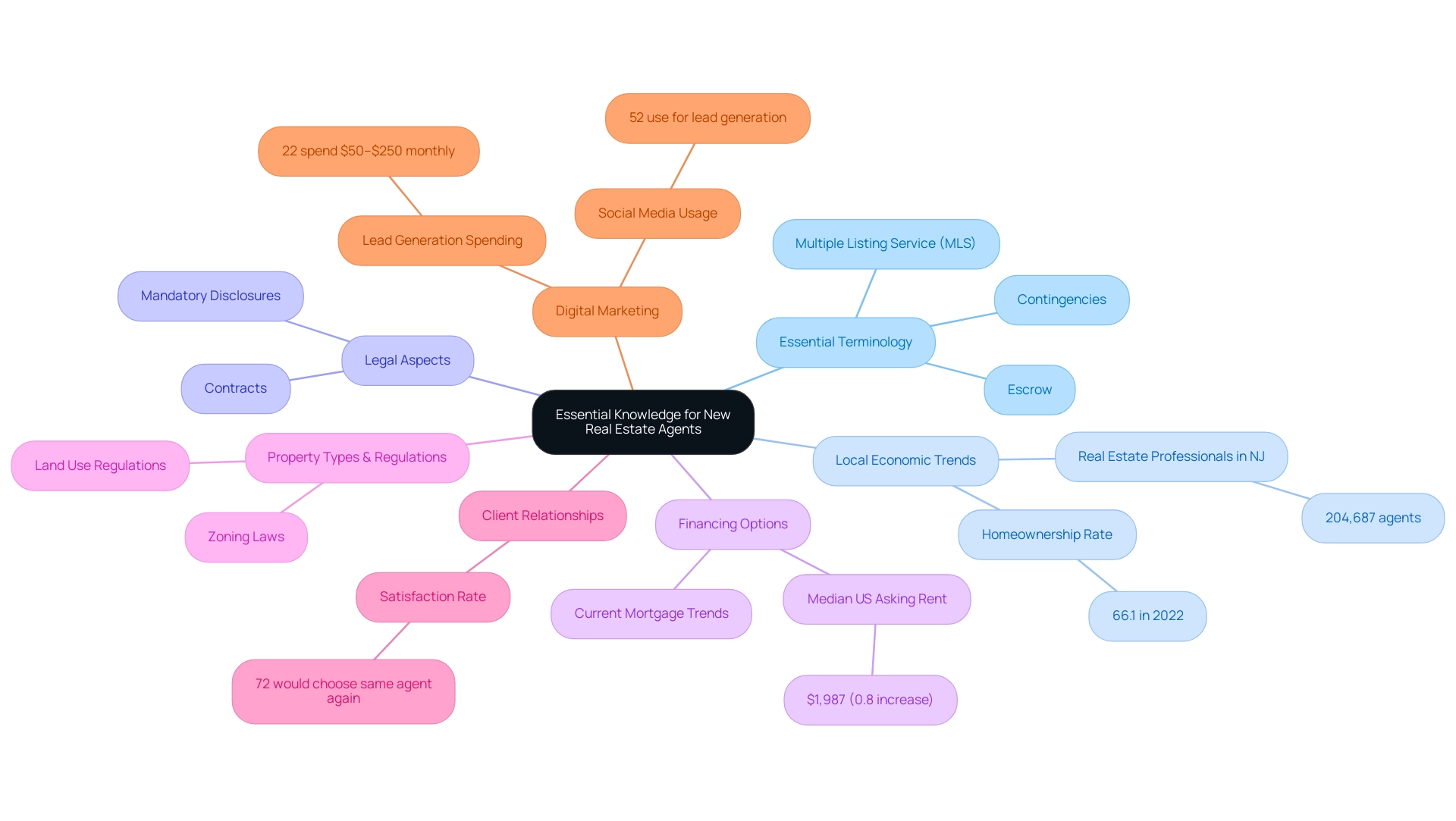
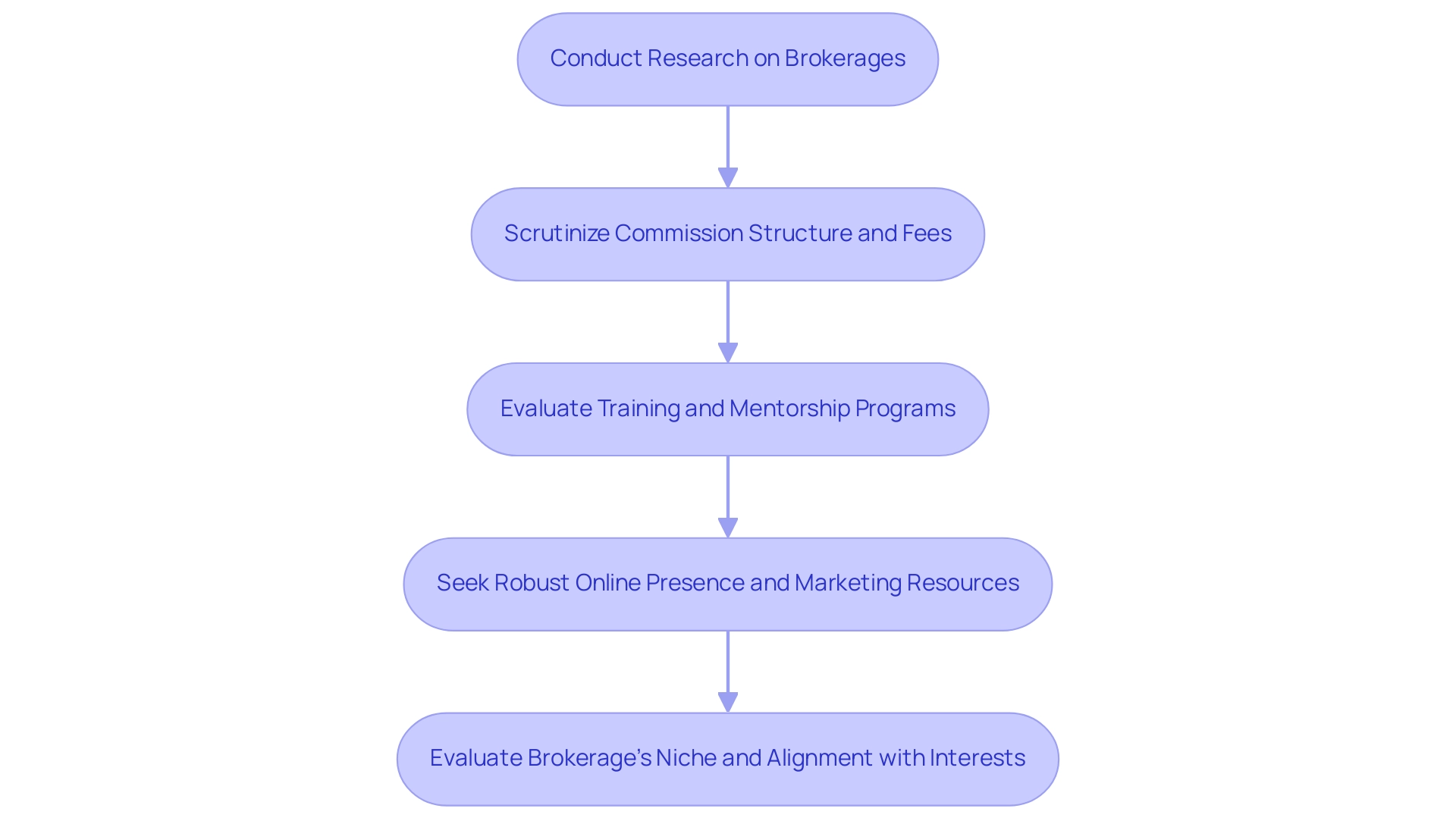

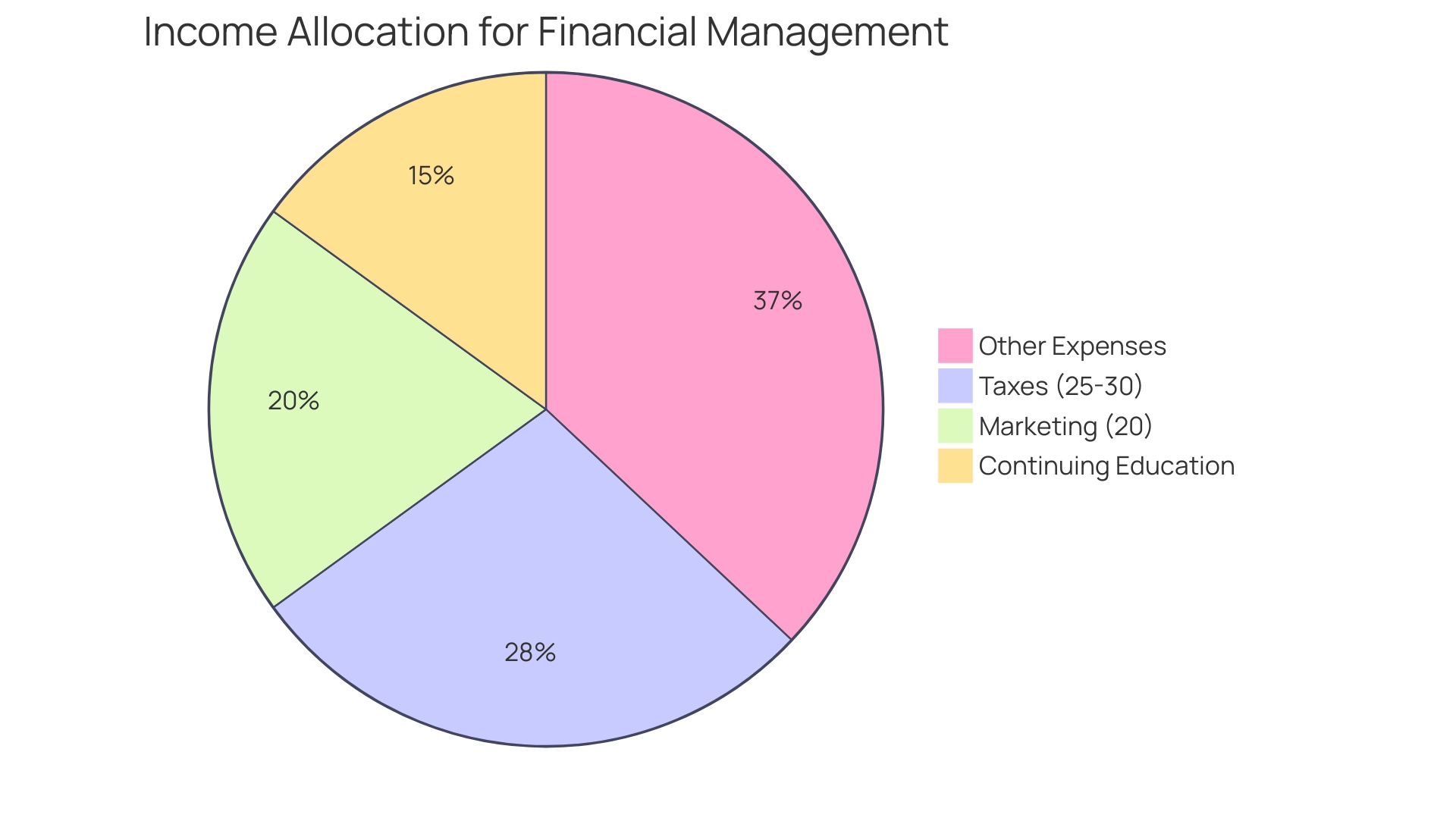
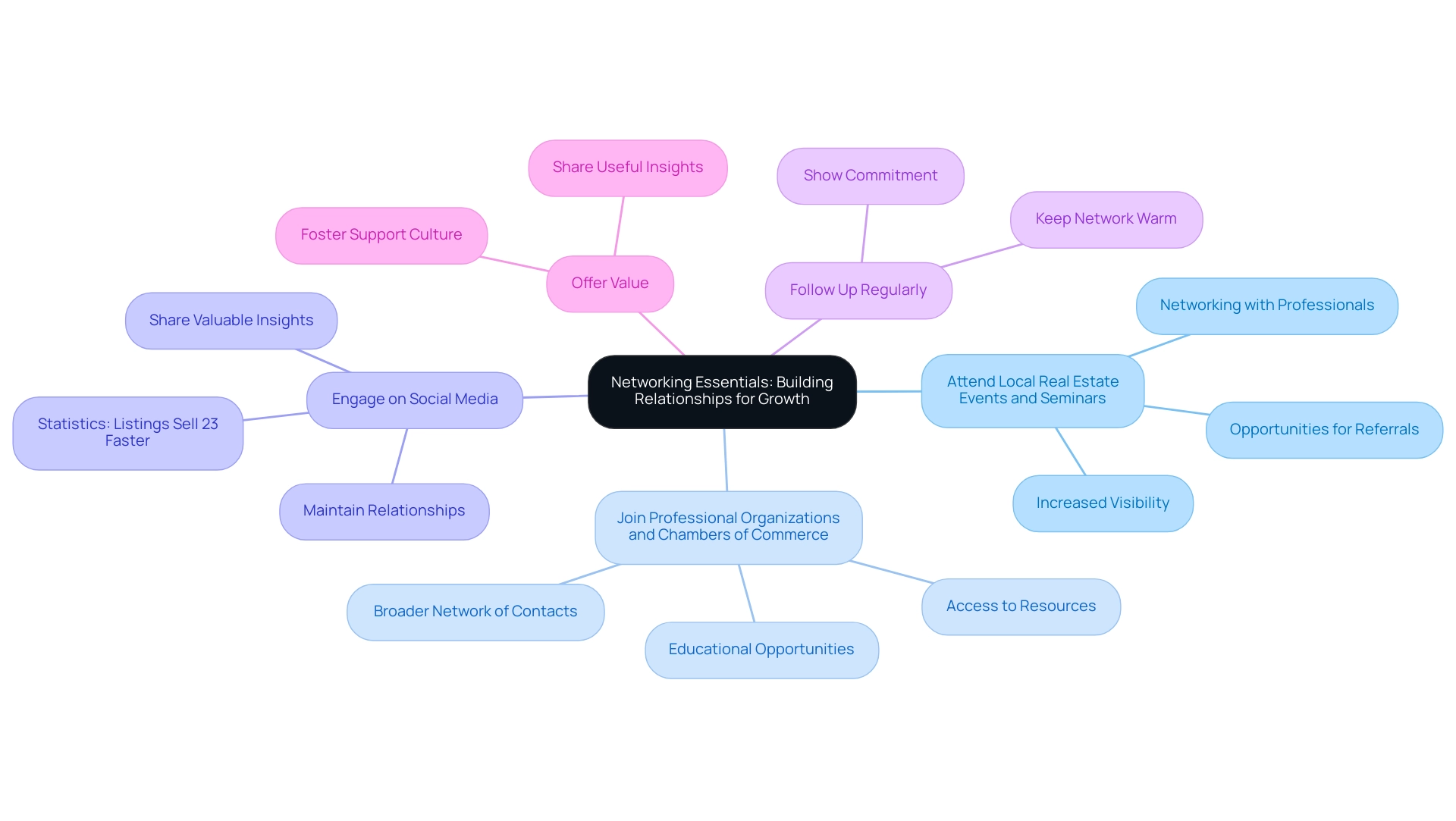
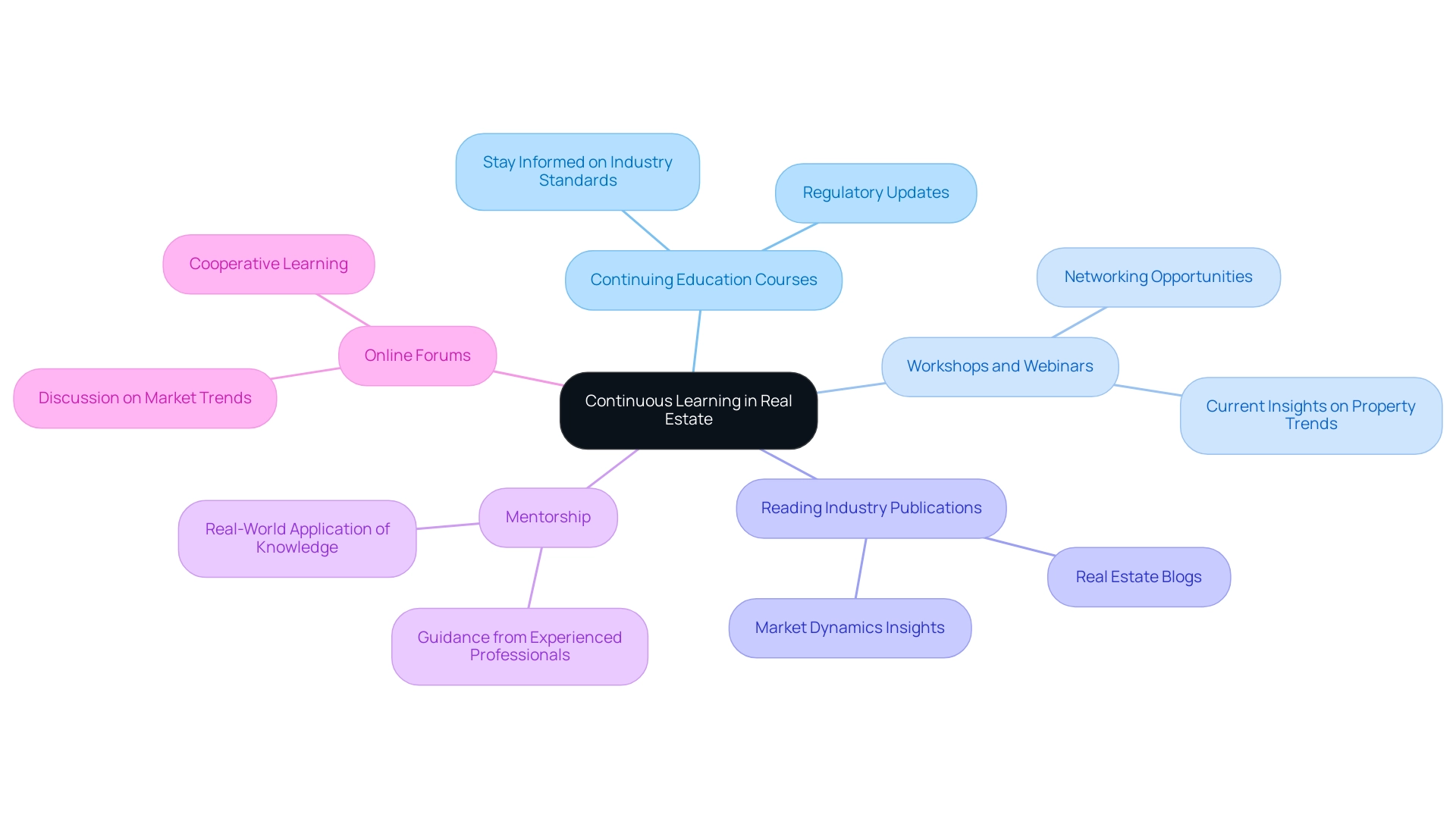
0 Comments